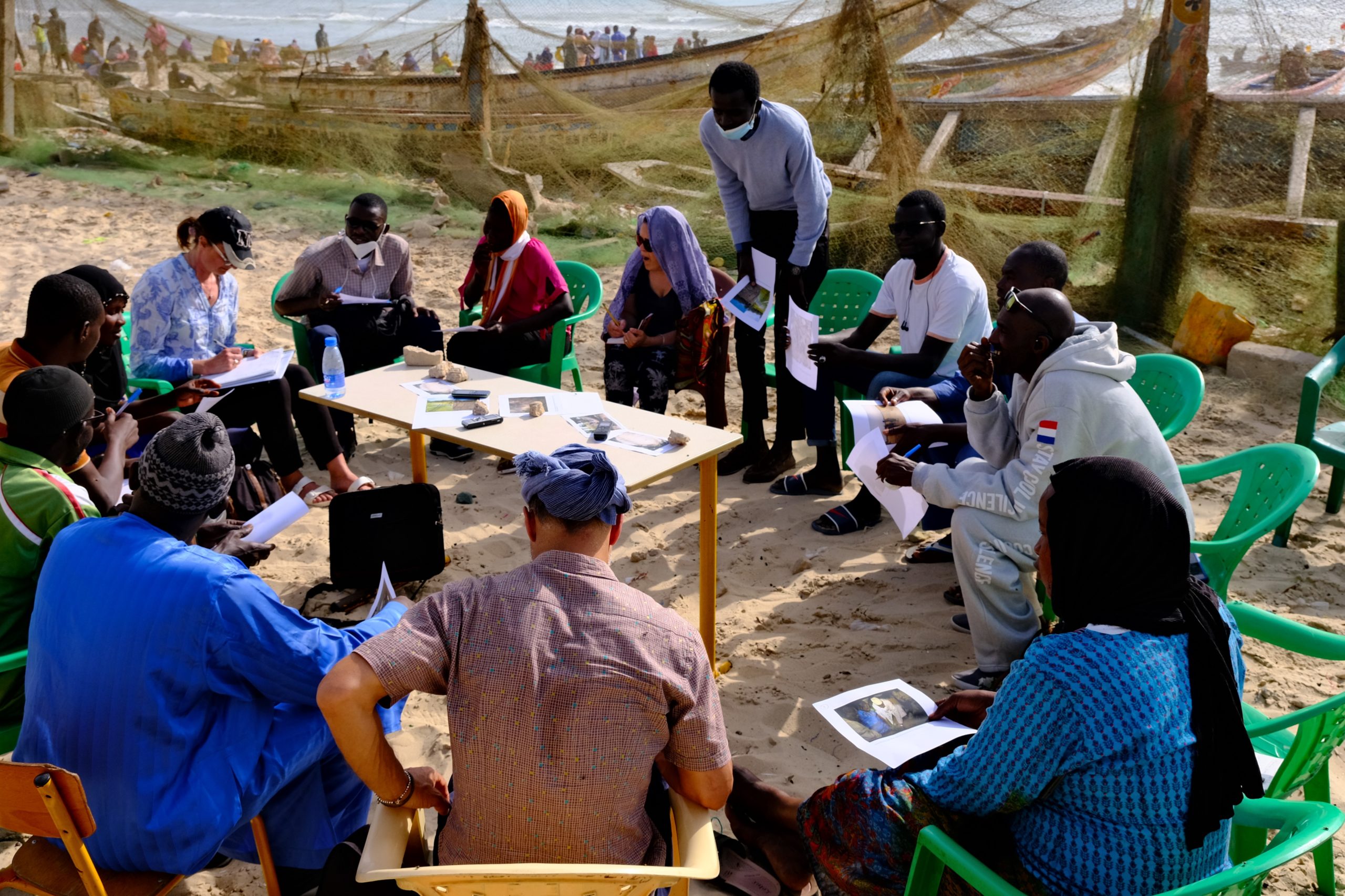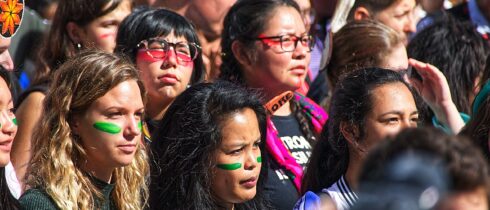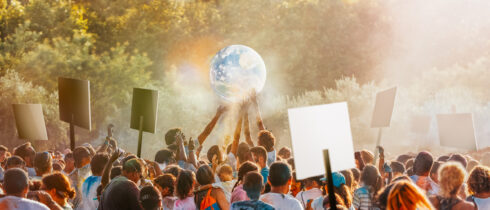

“What is climate change for you?”
Elena Giacomelli & Sarah Walker
“What is climate change for you?”
“What is climate change for you?”
Elena Giacomelli & Sarah Walker
This was the question the University of Bologna research team posed to research participants in Senegal to answer during our field visit to the country in May 2021 as part of the #ClimateOfChange project. A question, that, as we shall see later in this piece, for our participants is a powerful force in the here and now of their everyday lives. Yet a force that is not purely ‘natural’, but instead intertwined with structural political, economic and cultural factors that worsen the impacts of the climate crisis upon everyday lives.
The research team, composed of sociologists Pierluigi Musarò and Elena Giacomelli, and geographers Elisa Magnani and Sarah Walker, visited Senegal on behalf of the project to work with climate activists and people affected by the climate crisis in two localities: Dakar and Saint Louis.

Senegal is a case study country of the project because it is highly environmentally fragile and faces concomitant sea level rise, coastal erosion, soil salinization, maritime storms and depletion of fish stocks and biodiversity. About 52% of the population live in coastal areas, mostly concentrated around Dakar and other urban areas. Coastal erosion in Senegal is determined by both natural processes and also by human actions, for example mangroves protected the coast, but have been lost due to urbanisation, worsening the effects. Rapid urbanisation is also leading to/ exacerbating waste problems. Increasing amount of waste is affecting both the process of disposal and purification of water as well as the rainwater runoff. Despite the country’s difficulties in managing its own waste, the EU is dumping its waste in Senegal.
The country has a high incidence of climate-sensitive economic activities, including farming and fishing. This is due to the high population density and the concentration of almost all economic activities in coastal areas. The fishing industry is being devastated as fish migrate elsewhere due to changing currents, water pollution reduces biodiversity and most importantly ocean grabbing is a major issue. The EU which has recently re-signed a fishing agreement with Senegal has been strongly criticised for its role in the depletion of West African fish stocks.
To ‘de-naturalise’ the climate crisis, often portrayed as natural disasters which then masks both the socio-political responsibilities and the global inequalities at the heart of the crisis, such as ocean grabbing, our research draws on sociologist Mimi Sheller’s concept of ‘mobility justice’. This expands the notion of climate justice, broadening our understanding to include climate change, unsustainable urbanisation and unsustainable bordering systems as a combined crisis. The concept reflects the interconnecting strands that emerge from the project: the right to mobility, the right to live in a healthy environment, and the unequal access to such rights across the globe.
During our field visit, we examined how the people living in Dakar and Saint Louis experience and perceive the effects of climate change upon their lives through qualitative research, semi-structured interviews, focus groups and visual climate diaries. We worked with two Senegaese facilitators, Modou Mbaye in Saint Louis and Mamdou Diaw in Dakar, who acted as cultural and linguistic bridges for our team. This also allowed us to reflect back with both of them on the research findings and some particularities of Senegalese culture, expressions in the Wolof language, and understandings of the environment itself. Such issues do not necessarily reflect our Eurocentric perspectives. Via the ‘climate diaries’, we asked participants to share photos and perceptions of the climate crisis over a period of time through a WhatsApp group. The photos we received in response reveal the intensity of the phenomenon in their lives. A question that we, as two European academics based in Italy, may struggle to answer as a lived experience, as a concept that directly affects our everyday lives. Perhaps we may think of Venice as it sinks (Elena), or the floods in the UK (Sarah), issues which connotate a spatio-temporal distance. We also shot short video-interviews in order to enable people to directly share their experiences within the project (figure 1 and figure 2). People were really keen for their experiences to be publicly heard and to raise awareness of the climate crisis as it is for them. Particularly, some were keen to engage with youth in Europe to create global solidarity.


This picture (figure 3) shows our first focus group. It was held on the beach in the open air, both for covid safety purposes, as we are researching in the time of the pandemic, and to enter further into the everyday world of the participants. The beach was particularly poignant as, as participants informed us, we were sitting in the site where once a school stood.

What struck us most, was when we asked our participants, via the climate diaries, ‘what does climate change mean to you?” The responses we received ,were dramatic. An everyday lived and visual reality of the devastation of the climate crisis on people’s lives. The two photos below show the degraded and depressing environment, the village disappearing under the sea and the sense of abandonment.
MAMADOU shares this photo of a primary school destroyed by the sea in Guet Ndar

MODOU- this photo shows the terrible damage that the area is suffering

The treetops in this photo show where once there was land and buildings. All now submerged under the sea, which is still encroaching. As people tell us, the impact of coastal erosion and sea level rise is destroying not only the physical landscape but also livelihoods and memories.
As our preliminary findings show, the climate crisis is affecting historical mobility patterns. There is a large rural exodus in Senegal due to changes in rainfall patterns, desertification and lack of investment in new technologies destroying agricultural livelihoods in rural areas. These are people mainly seeking to work in coastal/urban areas and return to their home region in Senegal, or perhaps to save money for the dangerous journey via pirogue (small wooden boats) across the Atlantic to Spain (the Canary islands). As our participants recognize, owing to the highly restrictive visa system and the low passport ranking of Senegal in the passport index (rankings are based on the number of destinations their holders can access) regular channels to migrate are extremely limited. Leaving little mobility options. Many people wanted simply the option to go and return.
In this reality, the intertwining of climate change, unsustainable urbanisation and unsustainable bordering systems creating an inhospitable environment for those that live there are evident.
Next steps…
In addition to feeding into the final project report and campaign strategy, and providing a short thematic card of the findings from Senegal, we are engaged in creating a short film documentary, inspired by Moussa Diop and Thomas Grand’s Golden Fish, African Fish, a short book (in Italian) including images, covering the main themes of waste, migration, fishing and environment and the circularity and intersectionality between them, as well as articles covering the academic analysis of the data. Additionally, we will hold a photographic exhibition from our field visit as part of the conference we are organizing with our colleagues in Unibo in November 2021, at which Seneglease academics and activists will be invited to speak. Watch this space!














